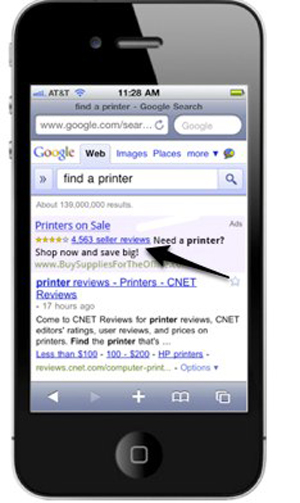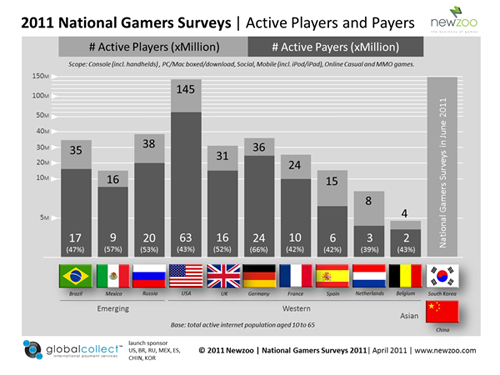每日观察:关注Android Market销售报告新服务(4.27)
1)谷歌Android Market最近面向开发商推出了新型销售报告服务,支持开发商通过该功能了解用户的更多交易细节,例如他们所使用的手机类型、货币和当前汇率等额外信息。
开发商可由此了解用户手机的屏幕大小、键盘类型等情况,为用户提供更优化的支付服务。而货币和汇率信息则可方便开发商针对不同国家市场设置价格(游戏邦注:该平台于今年1月份开始支持开发商根据不同地区设定产品价格)。苹果iOS平台的付费应用定价的下限是0.99美元,但Android产品定价并没有统一的标准,目前Android Market的头号付费应用包括1.46美元的X Construction、6.01美元的Titanium Backup Pro,以及1.28美元的《水果忍者》。
2)Android手机游戏公司Happy Monster Games最近根据维基泄密这一题材推出了其首款游戏《Trickyleaks》。在这款1美元手机游戏中,玩家的任务是扮演“一家罪大恶极的超级公司”,并极力对世界隐瞒和掩饰公司的丑闻。这些公司包括Pear(隐喻Apple),Sawwit(暗指Reddit)以及Mineshaft(影射Minecraft)。
该公司由22岁的Zachary Cohn和23岁的Justin White这对双人组合创立,主要专注于Android手机及平板电脑游戏项目,其宗旨是根据流行文化现象创建游戏。Cohn表示,Android手机游戏领域竞争异常激烈,新人很难在这个市场立足,所以他们决定根据时下热点话题创建内容,认为这样可以使其迅速成为热门搜索字段,通过与该流行文化现象形成联系而获得更多曝光率。
3)手机游戏开发商DstinctDev最近宣布公司总部将搬迁至西雅图,以利用当地人才资源,扩大公司规模。这家位于佛罗里达的公司成立于2004年,已推出热门手机游戏《The Moron Test》,面向iPhone、Android、Windows Phone 7、诺基亚和黑莓开发项目。该公司发言人表示他们迁至西雅图的目的与社交游戏开发商Zynga一样,主要用意是挖掘当地人才,虽然短期内只会招聘少部分新成员,但希望能像Zynga一样迅速扩张。不过该公司至今未明确在西雅图的具体落户地址,仅表示很可能选择Pioneer Square附近的地区。
4)据谷歌与市场调研公司Ipsos OYX联合展开的一项调查显示,智能手机已渗入人们生活中的各方各面。调查发现,93%的智能手机用户在家使用手机,81%受访者通过手机浏览网页,77%通过手机搜索内容,72%在关注其他媒介内容的同时使用手机。三分之一的受访者使用智能手机看电视,45%使用手机来预订晚餐地点、安排旅游行程以及理财等日常活动。还有39%用户自称在洗手间中也不离手机,每五个用户中就有一者称自己可以不要有线电视,但不能没有智能手机。
该调查还发现,每10名用户中就有9人表示,自己会因手机搜索结果而付诸行动,53%受访者称这种搜索结果会促使他们进行消费。这种搜索结果还影响了用户的其他行为,例如24%用户会因搜索结果而向他们推荐某个产品或品牌,有53%受访者会在自己的电脑上继续搜索更多相关信息。27%的智能手机用户曾通过移动网站购买产品,22%用户通过应用程序买东西。
5)著名笔记应用软件Evernote首席执行官Phil Libin在日前的VentureBeat移动峰会上发言表示,苹果用户比非苹果用户更有价值,但他称自己也不清楚为何苹果用户更愿意为应用服务掏钱。据他所称,Evernote在iOS平台的收益占公司总收入的28%,该应用的iOS版本用户数量远胜其他手机平台。在他看来,iOS用户价值第一,Mac用户其次,Android用户第三。
除此之外,他还表示原版应用程序的用户也比网页版用户更有价值(游戏邦注:该公司的主要营收来自iOS、Windows和Mac应用程序),并表示不可轻视桌面应用程序的力量——他们的Windows版应用程序占公司总营收的24%,而Mac版本应用程序占20%。
他在发言中的四个结论包括:1.用户使用服务的时间越久,他们就会更愿意为其付费;2.原版应用的用户价值远超网页版用户;3.苹果用户比非苹果用户更超值;4.不可低估桌面应用程序的价值。
6)据Newzoo最近发布的调查报告显示,巴西、俄罗斯、墨西哥、西班牙等新兴市场国家的在线及手机游戏玩家消费能力已接近欧洲主流市场的水平。
该调查指出,墨西哥的活跃玩家总数为1600万人,巴西是3500万,俄罗斯是3800万。与西方市场一样,这些新兴国家平均有50%的用户为游戏付费,这些用户约有三分之二的游戏预算流向了在线游戏领域。西方市场用户的在线、下载和手机游戏消费支出,首次超过了零售包装类游戏。
巴西和俄罗斯的网络覆盖率虽然比较低,但发展速度很惊人。在巴西以及俄罗斯的4600万活跃网民中,至少有75%用户在玩游戏。目前这些用户玩游戏的时间已超过看电视,他们平均每周玩11个小时的游戏。47%的巴西玩家和53%的俄罗斯玩家为游戏付费,其消费水平已接近欧洲市场。超过三分之二的用户购买在线及手机游戏的虚拟道具。
该报告还指出,俄罗斯用户的在线游戏交易在2010年增长了103%,巴西同期的增长率是228%。在这个过程中,Boletos Bancário (巴西)和WebMoney(俄罗斯)等本土支付方式发挥了重要作用。
但在西方市场,游戏玩家总数及消费水平自2010年以来并无明显变化。但欧洲玩家在游戏上的投入时间正逐渐赶上美国用户,在线、手机及下载游戏在玩家游戏预算中占据了一半以上比例,MMO游戏消费占玩家支出的10%,约80%的在线游戏玩家都在使用虚拟货币,仅15%的玩家曾购买Facebook Credits。(本文为游戏邦/gamerboom.com编译,转载请注明来源:游戏邦)
1)Android Market Introduces Merchant Sales Reports for Developers
Android Market unveiled a new type of merchant sales report to developers today that shows extra transaction details about the consumer. The extra data will help developers understand what kinds of devices their paying consumers are carrying, the currency they use to pay and the current foreign-exchange rate.
This could help developers better optimize the payments experience for consumers if they learn that most of their paying users have devices of a certain screen size or with or without a keyboard.
The extra information about currencies should also help developers better price their apps in different markets. Android began allowing developers to adjust the price of their applications for different markets back in February. While paid apps on iOS tend to have prices ending in $0.99, Android prices can be all over the place. The top paid apps in Android Market today range from $1.46 for X Construction to $6.01 for Titanium Backup Pro to $1.28 for Fruit Ninja.(source:insidemobileapps)
2)Mobile gaming company looks to capitalize on WikiLeaks
Two buddies who worked as interns for the National Security Agency in high school are now turning their attention to mobile games. Their Seattle company, Happy Monster Games, is launching a new title this week for Android called Trickyleaks.
The $1 game is a play off WikiLeaks in which game players take on the role of “a big, bad evil mega-corporation” trying to hide secrets from the world. The companies include Pear (a play off Apple), Sawwit (a play off Reddit), and Mineshaft (a play off Minecraft).
“We looked around, and since everyone was talking about WikiLeaks, but no one had made any real effort at a game based on it, we decided that would be a good subject for our first game,” said Zachary Cohn, who currently works at social media agency Banyan Branch.
Cohn, 22, and co-founder Justin White, 23, are bootstrapping the new company, which is focusing on Android-based mobile phones and tablet computers. The goal is to try to build games that capitalize on trends in popular culture, and Trickyleaks is the first attempt.
“We knew we wanted to launch an Android gaming company, but there’s a lot of noise in the market and it’s hard for someone new to stand out and get talked about,” said Cohn.
“One thing we’ve learned is that if you can take something that is popular, or something that will be popular, and be the first to create content for it in a medium, you can dominate search terms and generate a lot of new discussion about what you’re doing in connection to the popular trend,” explained Cohn.(source:geekwire)
3)Mobile games startup DistinctDev moving to Seattle for talent pool
Mobile gaming developer DistinctDev is moving its small corporate headquarters to Seattle to tap into the region’s mobile development talent pool.
Florida-based DistinctDev, creators of the popular mobile game The Moron Test, was founded in 2004. The company joins social gaming company Zynga in setting up shop in Seattle to recruit talent in this region.
In the short term, DistinctDev is likely to add only a handful of new employees. But like Zynga, DistinctDev hopes to expand rapidly.
A lot of the pull that Zynga sees in Seattle is what is attracting DistinctDev as well, said the spokesman.
DistinctDev develops mobile game apps for iPhone, Android, Windows Phone 7, Nokia and Blackberry, and the company said Seattle’s growing interactive entertainment cluster is an attractive location to set up shop.
DistictDev has yet to choose a Seattle office location. But it’s likely to be near Pioneer Square, according to the company spokesman.(source:techflash)
4)Google Survey: 39 Percent Of Smartphone Owners Use Their Devices In The Bathroom
Google recently commissioned a survey (in partnership with market research firm Ipsos OTX) to gain insight into the usage and behavior of U.S. consumers with regard to their smartphones.
According to Google, the goal of the research was to understand how smartphones are used in consumer’s daily lives and specifically how it has influenced how consumers search, shop and respond to mobile advertising.
The study confirms what most of us already know. The report finds that in terms of general usage, 93% of smartphone users use their phones at home; 81% browse the Internet and 77% search on their phones, 72% of smartphone users use their phones while consuming other media. One-third of smartphone owners use their phones while watching TV. And 45% of smartphone consumers use their phones to help them to manage and plan activities, such as for dinner plans, travel arrangements and finances. Google says that 39% admit to having used their smarpthone while going to the bathroom and one in five users would give up their Cable TV in order to keep using their smartphones.
Nine out of ten smartphone searchers have take action as a result of a mobile search, with over half leading to a purchase (53%). Search also influences other types of actions; for example, 24% have recommended a brand or product to others as result of a smartphone search. And 53% continue to research online by looking for more information on their computers.
Interestingly, 27% of smartphone purchases were made through a mobile website and 22% were made through apps. Smartphone shoppers spent a median of $300 on purchases made on their smartphones in the past year. Entertainment, electronics and apparel items lead as the most popular purchased items. (source:techcrunch)
5)Evernote CEO: Apple users are more valuable than non-Apple users
Evernote, a note-taking and reminder app that works across computers, phones, and mobile devices, said today that users of Apple devices are more valuable to the company than non-Apple users.
The comments, from Evernote chief executive Phil Libin today, confirm what many are already seeing in the mobile industry.
Libin said that iOS was its leading platform for overall revenue, accounting for 28 percent. iOS also topped all other platforms when it came to total amount of users gained per Evernote developer working on the platform. It also led in total revenue earned per developer. Evernote, in the end, is a compelling case for success on Apple’s iOS app store.
Desktop Mac users also stuck with the service more than any other platform’s users , and they also generated more user and revenue growth than their Windows counterparts. Libin said he wasn’t sure why Apple users end up being more comfortable paying for a service, but obviously it’s an important figure to note. In a ranking of overall user value, Libin notes that iOS and Mac rank first and second respectively, while Android ranks third.
Libin made the comments on stage this evening at VentureBeat’s Mobile Summit. And the value of Apple users was just one of four main points in his presentation about Evernote’s massive success.
The company’s software lets users save notes — anything from text, images, photos, or files — on their computers and mobile devices, which are then synchronized to cloud servers and subsequently accessible on any web-connected device. Users can also subscribe to premium features, including larger file upload capabilities,for $5 a month or $45 a year.
Evernote has long said that its users become more valuable over time, so it’s no surprise that the first major point Libin jumped to was the company’s most valuable users. He also discussed some new analysis around Evernote’s “cohort” user classification, which is a method the company uses to group together users by the month they first started using Evernote.
After first joining the service, most users don’t return, but those select few who do end up generating tons of revenue.
The March 2008 cohort, for example, consisted of 31,334 users. By June 2008, only 11,000 of those users remained, and the company earned a measly $700 from them in that month. But by January 2011, those users ended up contributing over $10,000 in a month. That’s because users find Evernote more valuable the longer they use it, which leads them to subscribe to premium features.
Libin mentioned that this sort of service — one that becomes more useful over time — wouldn’t be possible without cloud-based infrastructure. Consumers are more used to services that become less valuable over time, or those, like a newspaper, that have sustained value.
Libin then went on to point out data that showed how native application users are far more valuable to Evernote than web users (the company’s top revenue came from its iOS, Windows, and Mac applications). Additionally, he said that we shouldn’t discount desktop applications — the Windows application generated 24 percent of the company’s overall revenue, while the Mac application accounted for 20 percent.
So to recap, here are Libin’s four major conclusions from his presentation:
1.The longer users stay, the more valuable they get.
2.Native users are more valuable than web users
3.Apple users are more valuable than non-Apple users.
4.Don’t underestimate desktop apps.(source: venturebeat)
6)Gap Closing between Emerging and Western Online and Mobile Games’ Markets Says Survey Sponsored by GlobalCollect
New and unprecedented results from Newzoo’s 2011 National Gamers Surveys involving more than 20,000 respondents in Brazil, Russia, Mexico, Spain, the US, and key EU countries reveal insights into gamers’ behavior and spending in countries perceived as low-priority markets for years. The uptake of online and mobile gaming has pushed the number of players and “payers” to a level comparable to major European markets. The number of people actively playing games ranges from 16 million in Mexico to 35 million in Brazil to 38 million in Russia. Equivalent to Western countries, an average of 50% of these consumers actually spend money on games. The research, sponsored exclusively by GlobalCollect, also revealed that more than two-thirds of the total game budget was spent online. For the first time, spending on online, downloaded, and mobile games has passed total retail boxed sales in Western countries.
Trends in Emerging Markets
Internet penetration and use in Brazil and Russia is relatively low, but growing at an enormous pace. Of the active internet population – 46 million in Brazil as well as Russia – at least 75% plays games. By now, more time is spent on playing games than watching TV: on average 11 hours per week. Of this group, 47% of Brazilian and 53% of Russian gamers spend money, pushing the volume to major European market levels. More than two-thirds was spent on add-ons like virtual items for free-to-play online and mobile games.
Koen Vanpraet, CCO of GlobalCollect, commented: “As an international Payment Service Provider consulting clients on monetizing their gaming platforms, we see changes first hand. Year on year, total transactions grew 103% in Russia and 228% in Brazil in 2010. Local payment methods, such as Boletos Bancário (Brazil) and WebMoney (Russia), played a major role in this. We know research is vital to ensure gaming companies implement the right strategy to grow their online business and the results of these surveys enable us to advise our clients on a strategic level.”
Trends in Western Markets
In Western markets, neither the number of gamers nor their spend has changed much since 2010. But major changes can be seen in time spent on games in Europe, gradually catching up with the US; spending on online, mobile, and downloaded games now takes up at least half of consumers’ games budget, with MMO games applying to around 10% of the total wallet; virtual currency has become mainstream with an average of 80% of online gamers using it; only 15% of gamers ever bought Facebook credits. (source:financialpost)













































 闽公网安备35020302001549号
闽公网安备35020302001549号